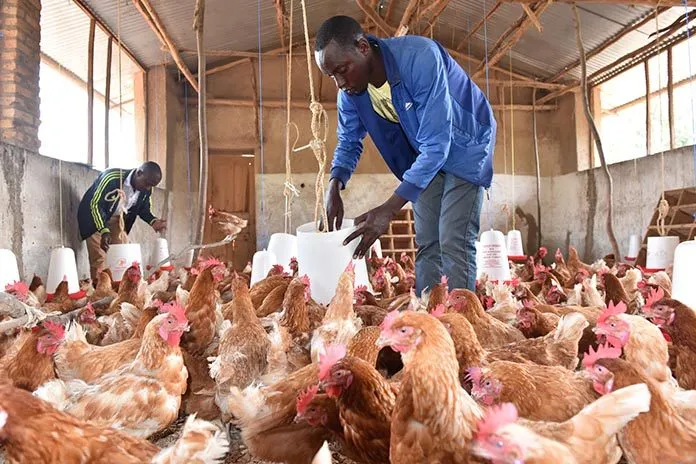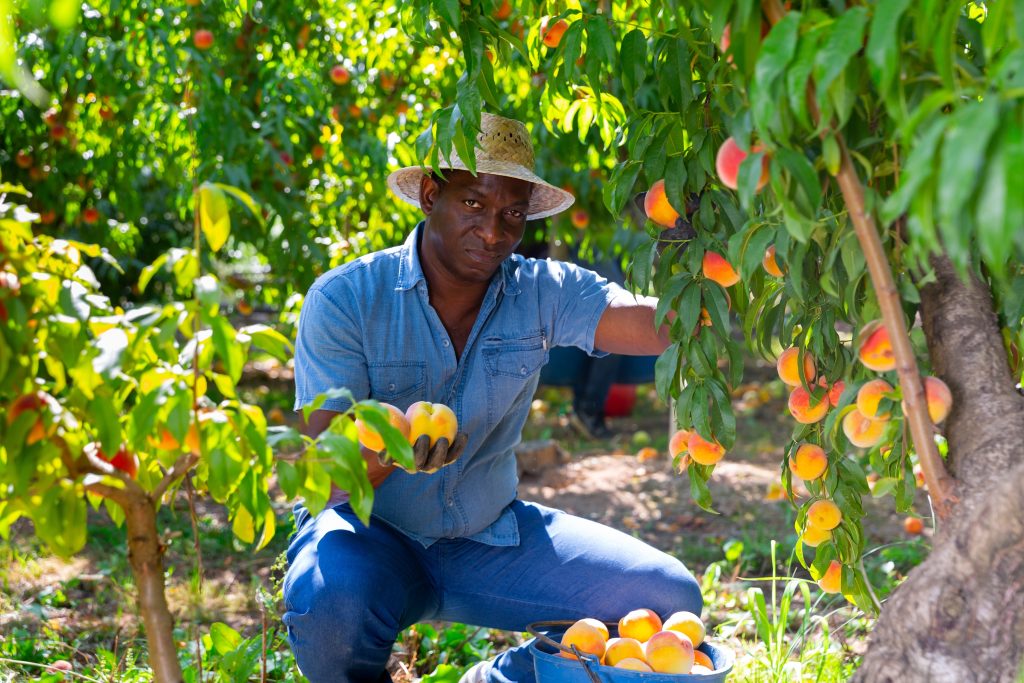
The journey to obtaining employment within the U.S. poultry sector as an international candidate encompasses a navigation through the intricate visa procedures of the United States. Despite its complexities, there is a multitude of visa options tailored for non-citizens to legally secure employment in the country. Gaining insight into the variety of job roles within the poultry industry, along with the relevant visa categories that correspond with them, is pivotal for international job-seekers aspiring to kickstart a flourishing career within the American poultry domain.
An In-Depth Look into the Poultry Sector of the United States
Ranked among the titans of global poultry production, the U.S. industry boasts an impressive processing capacity exceeding 9 billion broiler chickens each year. Industrial leaders such as Tyson Foods, Pilgrim’s Pride, and Perdue Farms command significant presence in the marketplace. The sector supports an extensive workforce, employing roughly 300,000 personnel throughout various segments including meatpacking plants, hatcheries, feed mills, and executive offices.
The southern regions of the country, particularly states like Georgia, Arkansas, Alabama, and North Carolina, have emerged as powerhouses in poultry operations. Despite this regional concentration, the industry’s nationwide reach ensures the availability of job prospects in diverse geographical settings across the United States.
Acquiring employment for foreigners aiming to enter the U.S. job market is often significantly facilitated by visa sponsorship. Poultry enterprises routinely extend sponsorship to adept candidates, ensuring they can lawfully secure their livelihoods and grow professionally within the nation’s boundaries. Consequently, this practice opens a vast array of professional avenues for individuals who possess the requisite expertise and credentials.
Required Qualifications and Competency Skills
In the realm of poultry business, candidates that showcase particular qualifications and competencies stand out, although job prerequisites might fluctuate depending on the position:
- Work Experience: Applicants with a storied history in poultry-related roles hold a competitive edge. This includes those with a track record in bird care, agricultural management, or expertise within processing environments.
- Educational Background: Degrees in the fields of agricultural sciences, animal sciences, veterinary studies, among other similar disciplines, are highly regarded. Such an educational foundation furnishes applicants with a comprehensive knowledge base covering poultry management methodologies, nutritional needs, and health-related aspects.
- Technical Savvy: Proficiency with modern poultry farming procedures, adherence to food safety protocols, and the ability to operate specialized equipment is critical. Mastery in machinery operation, upholding sanitation standards, and regulatory compliance are skills in high regard in this industry.
- Flexibility: The capacity to work within an array of settings and adapt to evolving work demands proves integral in the ever-evolving poultry field. Professionals who can readily adapt to new challenges, climatic variances, and shifts in operational demands are treasured.
- Collaboration: Proficient communication skills and the ability to work collaboratively are cornerstone requirements for careers in the poultry sector. Being able to effectively partner with colleagues, farm supervisors, animal health experts, and other involved parties necessitates superb interpersonal skills, conflict resolution capabilities, and a propensity for teamwork.
Armed with a convergence of pertinent work experience, a robust educational pedigree, adept technical proficiency, an adaptable nature, and a collaborative spirit, individuals embarking on a poultry industry vocation are well-poised to excel in this key agricultural sector.
Diverse Employment Avenues within the Poultry Industry
The American poultry sector is teeming with employment prospects for job seekers sporting a wide spectrum of qualifications and areas of interest. Whether one aspires to engage hands-on at the farming level or to contribute to processing, health management, or nutritional aspects of poultry, a bounty of roles awaits both entry-level and experienced professionals.
1. Poultry Farm Associates
Grounded at the core of the industry, poultry farms necessitate a regiment of workers steadfastly committed to the meticulous care and management of the aviary population. Roles for poultry farm associates encompass a slew of duties including feeding routines, sanitation maintenance, and health status observations for the flocks. These essential roles, despite often not demanding high-level credentials, call for unwavering commitment and a resilient work disposition.
In the U.S., compensation for poultry farm associates typically spans from an annual sum of $25,000 to upwards of $35,000, influenced by variables such as the worker’s level of experience, the location and scale of the farm. Additionally, certain employers may present additional benefits encompassing housing provisions, medical insurance coverage, and performance-based reward structures.
2. Poultry Processing Facility Roles
Integral to the poultry supply chain, processing facilities transform live poultry into consumer-market-ready merchandise. These hubs of productivity offer an array of jobs spanning from processing line attendants to scrupulous quality assurance inspectors, all serving to guarantee safe, regulation-compliant poultry products.
Remuneration within poultry processing plants is tiered according to the role’s complexities and requisite are -scale experience. Beginners might start at an hourly wage ranging from $12 to $15, with avenues open for increased earnings as workers accumulate skills and industry know-how. Seasoned quality assurance personnel, taking into account their refined expertise, might see annual salaries that surpass $50,000, augmented with benefits like health insurance options and retirement savings arrangements.
3. Poultry Health Specialists – Veterinarians
The safeguarding of poultry health is tantamount to the ongoing success of the industry. Veterinarians dedicated to poultry care are tasked with the diagnosis and treatment of ailments, pre-emptive disease containment efforts, and the observance of strict biosecurity protocols.
These niche veterinary posts mandate elevated training and education, commonly a Doctor of Veterinary Medicine (DVM) degree with a concentration in avian health. In the United States, veterinary professionals specializing in poultry are remunerated with lucrative salaries that can range from $80,000 to as much as $150,000 annually, influenced by experiential depth, chosen specialization, and geographical location. Employers may further complement these roles with options like provisions for ongoing education, career advancement opportunities, and comprehensive health care plans.
4. Avian Nutrition Experts
Essential to achieving peak poultry health and yield, avian nutrition experts draft nutritious feeding regimens, delve into research to heighten feed efficiency, and provide consultative services to feed producers. Such roles generally necessitate advanced academic accomplishments in animal nutrition or related majors, accompanied by an intimate understanding of poultry dietary requirements.
Within the states, emerging nutrition specialists focusing on avian dietary needs may foresee earning annual salaries that span a range from $60,000 to $100,000, shaped by one’s educational attainment and accrued job experience. Employers may also extend additional incentives such as
In addition to offering rewards such as performance bonuses, the poultry industry also supports its workforce with flexible work arrangements and clear paths for career advancement within organizations.
5. Poultry Production Managers
As pivotal players in the poultry sector, production managers orchestrate the day-to-day operations of poultry farms or processing plants. Their duties extend to ensuring that the activities are streamlined to meet production goals, maintaining strict adherence to health regulations, and upholding the highest standards of quality.
Individuals in this role need to possess authoritative leadership qualities, a deep understanding of the poultry industry, and an innate ability to strategically manage both human and material resources. In the United States, the annual salary range for poultry production managers typically starts from $50,000 and can go up to $90,000 or higher. Compensation is often augmented with bonuses and profit-sharing schemes that reward exceptional performance and organizational success.
6. Poultry Geneticists
Geneticists in the poultry field are innovators focused on advancing characteristics such as rapid growth rates, optimal feed conversion ratios, and robust disease resistance within bird populations. These specialized scientists engage in comprehensive research, devise strategic breeding approaches, and apply cutting-edge genomic technologies in pursuit of specific genetic improvements.
The compensation for poultry geneticists in the USA reflects the specialized nature of their role, with salaries ranging from $60,000 to $120,000 annually. Their expertise also opens up additional avenues for financial gain through research grants, patent royalties, and other forms of intellectual property income.
7. Poultry Sales Representatives
Sales representatives are essential links between poultry producers and the industry’s supply chain partners, including feed suppliers and equipment producers. They are tasked with fostering robust partnerships, deeply understanding client requirements, and effectively pitching products and services to stimulate sales expansion.
In the US market, the remuneration for poultry sales representatives is tied to their sales acumen. They enjoy a base salary complemented by commissions, leading to total compensation that generally ranges from $40,000 to $80,000 per year. However, fluctuations in income are dependent on the individual’s sales expertise and the breadth of their sales territory.
The poultry industry presents an array of professional duties for individuals with a passion for agriculture, animal husbandry, and related disciplines. The sector spans a variety of opportunities, from on-the-ground farm work to sophisticated roles in veterinary practices and nutritional research, catering to diverse interests and skill sets.
Visa Options and Sponsorship Programs For Foreign Poultry Workers in the USA
An understanding of the various visa options and sponsorship programs is critical for those looking to lawfully engage in the American poultry industry. The following outlines some of the primary visas and avenues available to prospective poultry workers from abroad:
1. H-2A Visa Program
The H-2A visa program is tailored for temporary agricultural workers and extends to those in the poultry farming sector. It allows employers within the poultry industry to petition for H-2A visas to employ guest workers for cyclical or short-term positions. This program mandates employers to prove the scarcity of domestic labor and to provide internationally recruited employees with competitive wages and humane working conditions.
2. H-2B Visa Program
The H-2B visa program, akin to the H-2A, accommodates temporary non-agricultural laborers. Jobs in poultry processing and related tasks may qualify under this classification, although eligibility can vary in response to elements such as cyclical business needs and labor market deficits. Employers seeking to sponsor foreign workers must pursue labor certification and fulfill all program prerequisites.
3. EB-3 Visa Category
The EB-3 visa category pertains to individuals aspiring to secure ongoing employment opportunities within the United States, including positions within the agricultural sector. This type of employment-based immigrant visa is suitable for skilled workers, professionals, and also unskilled laborers (encompassing certain farm roles). To be eligible, candidates must generally have a lasting offer of employment from a US employer who is prepared to sponsor their immigration process.
4. Employer-Sponsored Visas
Many organizations in the poultry industry facilitate sponsorship for foreign talents through a variety of visa categories. These include the H-1B visa, which is reserved for specialty occupations, and the TN visa, available to Canadian and Mexican professionals under the North American Free Trade Agreement (NAFTA), now USMCA. Criteria and the application process for these visas differ, but what is essential is obtaining sponsorship from an employer willing and able to support a foreign worker’s immigration to the United States.
Embarking on the visa application journey can be overwhelming, but with in-depth research, the right aptitude, and support from immigration experts or attorneys, hopeful poultry industry workers from abroad can identify and navigate the pathways that lead to a fulfilling career in the thriving US poultry industry. Effective utilization of the available visa options and sponsorship programs allows international poultry professionals to materialize their ambitions to work in the American agricultural sector.
Popular States for Poultry Jobs in the USA
Certain states in the United States emerge as hubs of opportunity for those seeking employment within the robust poultry sector. These states offer substantial employment prospects in areas like poultry farming, processing, and ancillary services, providing fertile ground for individuals to cultivate rewarding career paths.
1. Georgia
Georgia, recognized globally as the “Poultry Capital of the World,” is a powerhouse of the poultry industry with an abundance of job openings. The presence of leading poultry corporations, expansive processing units, and numerous farms make Georgia an excellent place for job seekers with interest in various aspects of poultry work.
2. Arkansas
With a strong position in the national ranking for poultry output, Arkansas is another state boasting plentiful employment in the industry. It plays host to a significant number of renowned poultry companies and processing centers, ensuring a vast array of available positions ranging from on-farm roles to distribution and logistics.
3. Alabama
Alabama’s prominence in the poultry industry makes a notable contribution to its state economy and job market. The complete spectrum of the sector—from farms to processing plants—is present in Alabama, creating a diverse selection of job options for those interested in the poultry field.
4. North Carolina
North Carolina shines as another key state for poultry employment with its focus on poultry farming and processing. The state’s agreeable climate and agricultural infrastructure are conducive to poultry production, attracting a skilled workforce, including foreign labor, in search of industry opportunities.
5. Mississippi
In the heart of the Southern United States, Mississippi stands out as a burgeoning hub for the poultry industry. The state prides itself on its expansive growth in this realm, providing a wealth of job openings across various facets of the sector. Boasting an impressive array of poultry firms and processing units, Mississippi offers a fertile ground for professionals and novices alike aspiring to nurture a flourishing career in poultry agriculture and related fields.
6. Texas
The Lone Star State of Texas shines with its vibrant poultry sector, laying out a vast landscape of career possibilities. Its comprehensive network of poultry ventures, ranging from expansive ranches to state-of-the-art processing facilities, ensures Texas is ripe with diverse career pathways for those enthused by the prospects of the poultry trade.
Regardless if your expertise lies within seasoned realms or you’re charting your first steps into the poultry world, delving into the job market within these esteemed states could be the cornerstone of a rewarding occupational voyage. Their solid poultry foundations combined with a plethora of job openings beckon talent from wide-ranging locales, cementing these states as prime destinations for career-oriented individuals.
Advantages of Working as a Poultry Worker in the USA
As a beneficiary of a U.S. foreign work visa in the ever-growing poultry industry, individuals can reap multifarious advantages. Not only does the poultry sector promise consistent, year-long gainful employment, but it also frequently extends opportunities for overtime. This is a marked contrast to the seasonal work patterns observed in other segments of agriculture. Furthermore, the industry’s large processing plants are predominantly situated in rural localities where the living costs remain modest, thereby allowing individuals to leverage their income optimally.
Poultry facilities offer more than just jobs; they present burgeoning careers for workers at various skill levels. Entry-level positions involve comprehensive on-the-job training, providing novices with key proficiencies in areas such as meat processing, animal husbandry, adherence to stringent food safety standards, and meticulous quality control. This newly acquired expertise equips employees for upward mobility, setting the stage for advancement to supervisory, technical, or quality inspection roles. Conversely, immigrants with specialized qualifications in fields like veterinary science, engineering, information technology, or industrial machinery have the leverage to draw upon their backgrounds for higher-tier positions immediately.
Occupational rewards aside, securing a visa-sponsored poultry job concurrently confers the privilege of legal residency in the United States for those aspiring to permanent status. Simplifying the green card procurement process, this facet of the job fosters a smoother trajectory towards American citizenship. Ultimately, employment within the poultry sector offers immigrants the twofold advantage of propelling their careers and solidifying their future in the United States, all while aiding in alleviating the labor shortages experienced within crucial agribusiness enterprises. The spectrum of benefits extends from fiscal surety and vocational progression to personal well-being.
Wrapping Up
Non-native individuals eyeing the American dream may uncover substantial opportunities to secure poultry jobs in the United States with the boon of VISA sponsorship. These roles promise not only a reliable income but also the exotic experience of life in a country distinct from one’s homeland. Proactive exploration and strategic liaison with companies extending VISA sponsorship can markedly enhance the prospect of landing a position within the US poultry sector.
Transitioning to a new societal and cultural landscape carries its own set of challenges; hence, it’s imperative to navigate the immigration maze with due diligence. Equipped with determination and the resolve to persevere, hopeful overseas job seekers can unearth valuable and fulfilling careers in the bustling U.S. poultry niche.






![Cleaning Jobs In Canada For Foreigners With Visa Sponsorship [APPLY NOW]](https://career.lumpkinpedia.com/wp-content/uploads/2023/08/Screenshot-2023-08-08-7.08.41-AM.png)


